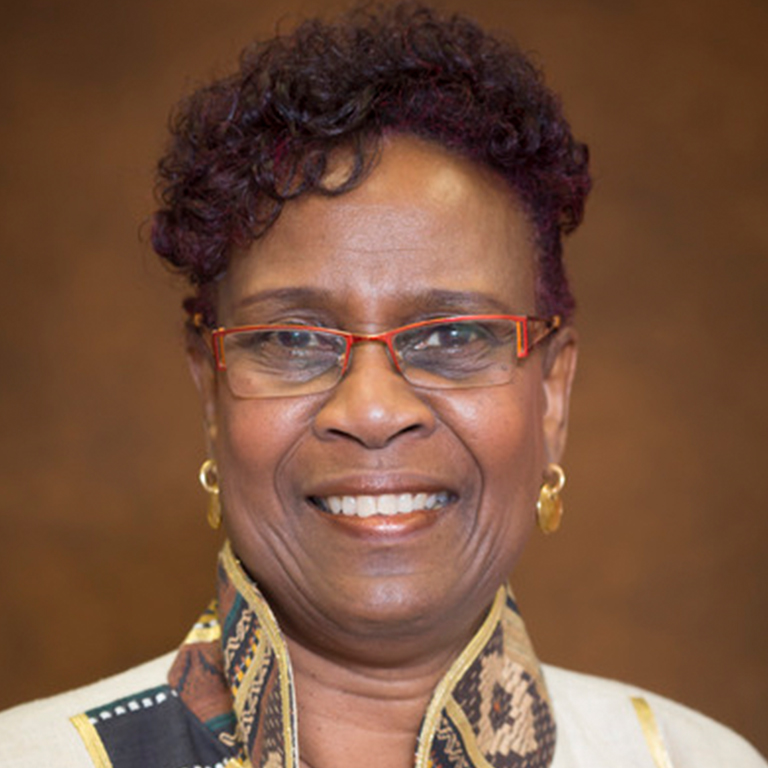- Ph.D., Indiana University, 1980
- M.M., University of Wisconsin, 1976
- B.M., North Texas State University, 1971

Mellonee V. Burnim
Professor Emerita, Ethnomusicology

Professor Emerita, Ethnomusicology
Throughout her career, Mellonee Burnim has intertwined, scholarship, creative activity, teaching, and service as evidenced by the landmark books and articles she has produced, the musical ensembles she has led, an archive she has directed, and perhaps most meaningful, the scholars she has mentored. It’s hard to believe that Mellonee’s time at IU has spanned 40 years. She came here to pursue a Ph.D. in ethnomusicology and was recruited to establish the African Choral Ensemble in 1976. She never stopped giving her time and love of music, scholarship, and performance to the IU and Bloomington communities. She began her career in the Department of Afro-American Studies (currently, the Department of African American and African Diaspora Studies). With her reputation as a leading scholar in Black religious music flourishing, she transferred to the Department of Folklore and Ethnomusicology in 1999.
We must first recognize Mellonee Burnim as a pioneer in the field of African American gospel music. When she began her research on this topic, she was one of only four scholars working in this field. Her experience as a performer informed her scholarly inquiry. Her written works have become essential readings for those studying African American religious music. Her articles can be found in many journals, including Ethnomusicology, The Western Journal of Black Studies, and the Garland Encyclopedia of World Music. Mellonee’s most significant scholarly achievement to date is the publication of African American Music: An Introduction (2006), co-edited with Portia K. Maultsby. Last year, a second edition of this seminal work was released; the companion edition, Issues in African American Music: Power, Gender, Race, Representation, came out last fall. Both are key texts on the subject in classrooms nationwide.
Mellonee’s scholarly contributions illustrate the range and quality of her research on religious music, providing a historical, socio-cultural, and political context for the evolution of the Negro spiritual and gospel music, their contemporary manifestations, and the interrelatedness of these two distinct genres. Dr. Bernice Johnson Reagon writes that, “Burnim’s strength is in her analytical work, based on her field research and theoretical application charged with prowess as a performer. As an accomplished musician in gospel music, Burnim brings into her scholarship expanded currency within the culture she is studying.”
Mellonee’s nontraditional approach established her as a pioneer on many levels. In addition to teaching performance in the choral ensemble, Mellonee provides students the opportunity to engage with music performance in its original context by taking them to a Black worship service where they experience the culture first-hand, acquiring a deeper understanding of the social values and traditions that inform the music-making process. As a teacher, Mellonee is a master at inspiring students to think critically abd to focus on broader concepts rather than on a mere series of facts. She has been an important mentor in the lives of her graduate students, guiding them seamlessly through the grueling process of dissertation writing and toward success in acquiring academic positions. Mellonee’s reputation as an educator has brought her a multitude of invitations to teach at other institutions, such as Yale University, the University of Malawi, the Theological Center in Atlanta, and the prestigious North Carolina Center for the Advancement of Teaching.
Mellonee has served as chair of the Department of Afro-American Studies, director of the Ethnomusicology Institute, and director of Undergraduate Studies in the Departments of Afro-American Studies and Folklore and Ethnomusicology. She must be recognized for the dramatic increase of majors and minors to the highest numbers in the history of both departments. At the campus level, she has been a strong advocate for promoting diversity in all areas of campus life. In fact, she was appointed by former Chancellor Ken Gros Louis as head of the Commission on Recruitment and Retention of Non-White and Women Faculty.
Mellonee’s reputation as a leading scholar of gospel music resulted in her serving as consultant for two films on this topic: We Love You Like a Rock and Saturday night, Sunday Morning. During her tenure as director of the Archives of African American Music and Culture, she produced two successful Themester forums: “Hot Buttered Soul; The Role of Foodways and Music-Making in Building and Sustaining African American Communities” and “Bodies of Sound: Locating the Beautiful in African American Music.” Both panels captivated their audience (standing room only) and Burnim directed corresponding exhibits to explore the ways musicians make broader commentary on history, culture, politics, and social relationships. A highlight of her career is Why We Sing: Indianapolis Gospel Music in Church, Community, and Industry—a landmark conference addressing crossover marketing of sacred music, performance, and African American entrepreneurship.
Beyond the university, Mellonee’s skills as a musician and teacher have given her a leading role in the religious life of Bloomington. She has served as the minister of music for the congregations of Bethel African Methodist Episcopal Church and Fairview United Methodist Church. In addition, she has published the results of her research and experience, making them generally available to choir directors in churches throughout the nation.
Mellonee Burnim reaches gracefully in two directions as an educator—inward to the university, outward to the national and international community—building a bridge between scholarship and service through her research, performance, and professional action. Her presence will surely be missed.
-Portia Maultsby, Fernando Orejuela, and Ruth Stone